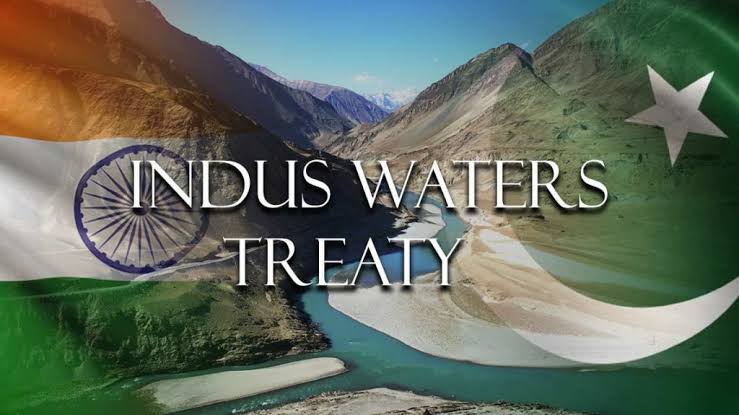Indus Water Treaty: Safeguarding Pakistan’s Future

The Indus Water Treaty (IWT), signed in 1960, has long served as the basis of transboundary water cooperation between Pakistan and India. Crafted with the intent to share the life-giving waters of the Indus River system, the treaty has underpinned peace and agricultural prosperity, particularly for Pakistan, a country whose very sustenance and economy are inextricably linked to these waters. This delicate balance, however, faces potential upheaval. Recent signals from India suggest a reconsideration of the treaty’s terms, an action that could have severe repercussions for Pakistan.
The IWT’s allocation of water from the six rivers of the system—granting Pakistan the larger share from the western rivers (Indus, Jhelum, and Chenab) and India full control over the eastern rivers (Sutlej, Beas, and Ravi)—has been fundamental to maintaining agricultural viability in Pakistan. However, as a low riparian state, Pakistan now stands victim to the highhanded upper riparian politics of India.
The construction of the 330 megawatts Kishanganga and the 850 megawatts Ratle hydropower projects by India in the illegally occupied region of Jammu and Kashmir has heightened concerns in Pakistan of a strategic manipulation of water flows i.e. the Kishanganga project is poised to divert the water from Neelum River into the Bonar Madmati Nullah in violation of the Treaty. From Pakistan’s perspective, these initiatives represent a significant peril to its populace, land, and wealth, particularly during the critical sowing season across the nation.
When viewed through the lens of security, these undertakings harbour the ominous possibility of triggering flooding incidents amid military confrontations. India’s primary objectives encompass not only electricity generation but also the pursuit of strategic dominance over Pakistan. The anticipated completion of the Wullar Barrage stands to bolster India’s military posture, potentially providing an entry point into Pakistan during periods of conflict.
Such actions not only threaten the agricultural backbone of Pakistan but also signal a shift toward a more aggressive stance on water management by India. The issuance of a notice by India to renegotiate the treaty underscores a critical juncture for the IWT and the future of Indo-Pakistani relations.
However, the Permanent Court of Arbitration (PCA) in The Hague last year made a significant decision by dismissing India’s objections to a procedure initiated by Pakistan concerning water usage within the Indus River basin, effectively reopening a case stalled for years. This ruling validated Pakistan’s grievances, acknowledging the PCA’s jurisdiction to adjudicate the dispute surrounding the design modifications of India’s Kishanganga and Ratle hydroelectric projects. It is worth mentioning here that despite Pakistan’s efforts to seek resolution through the PCA since 2016, and its earlier attempts to address concerns via the Permanent Indus Water Commission, India opted out of participating in The Hague’s court proceedings, challenging the court’s authority and asserting that the construction of its hydroelectric projects was in accordance with the IWT. Pakistan, on the other hand, has repeatedly said that it remained fully committed to the implementation of the treaty, including its dispute settlement mechanism.
Pakistan’s steadfast approach to the treaty, particularly in the face of India’s recent attempts to alter dispute resolution mechanisms through the Permanent Indus Commission, is a bold reminder of the importance of safeguarding vital water resources for its people and agriculture. To safeguard its interests effectively, Pakistan must develop and implement a comprehensive strategy that encompasses various dimensions. This strategy should involve diplomatic efforts aimed at fostering constructive relationships with neighbouring countries and international stakeholders, engaging in dialogues and negotiations to mitigate tensions and resolve disputes related to water resources.
Additionally, Pakistan should leverage legal avenues to reinforce its rights and entitlements concerning water usage and distribution, adhering to international agreements and conventions while advocating for fair and equitable access to shared water resources. Enhancing domestic water management practices is essential, involving investment in infrastructure development, such as dams, reservoirs, and irrigation systems, to optimise water storage and distribution, as well as implementing efficient water conservation measures and promoting responsible water usage among citizens and industries.
Moreover, the engagement of influential international institutions like the World Bank, which played a significant role in facilitating the formation of the treaty, cannot be overstated. It is imperative to proactively ensure that the treaty’s stipulations are adhered to, emphasising the need for a renewed dedication to the principles of equitable and rational utilization of shared water resources. This entails fostering a collaborative spirit among all stakeholders and bolstering mechanisms for monitoring and enforcing compliance with treaty provisions. Additionally, promoting transparency and facilitating robust information-sharing mechanisms among riparian states and international bodies is paramount for building trust and fostering effective cooperation in the management of shared water resources.
The IWT has not only been a cornerstone of India-Pakistan relations but has also served as a testament to the possibility of cooperation in critical areas of mutual interest, even amidst political tensions. Any move to abrogate or undermine the treaty not only jeopardises the water security of millions but also risks escalating tensions in an already volatile region.

